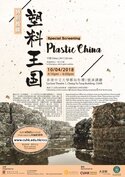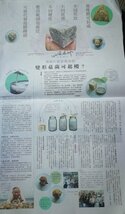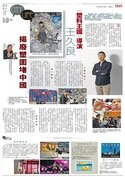

Special Screening of Plastic China (塑料王国) (2018-04-10)
《塑料王国》特别放映 Special Screening of Plastic China
2018.04.10 | 4:10pm – 6:00pm
香港中文大学郑裕彤楼1号演讲厅 Lecture Theatre 1, Cheng Yu Tung Building, CUHK
*导演王久良将出席放映会,由胡嘉明教授主持问答环节。
*Followed by a Q & A session with director Wang Jiuliang moderated by Prof. Wu Ka-ming.
《塑料王国》Plastic China
中国 China | 2017 | 82 min
普通话及中国方言对白,英文字幕In Putonghua, with English subtitles
继2012年《垃圾围城》,王久良再花五年拍摄中国环境另一「绝望真相」:世界最大回收塑料进口国。塑料回收产业既给「世界工厂」带来低廉原料,同时亦带来巨大环境灾难。纪录片聚焦在有30多年旧塑料加工历史的沿海小镇,人物是「塑料王国」中成长的依姐,她的童年充斥著世界各地的塑胶垃圾。拍摄四年间,她不断试图摆脱眼前困境,渴望和一般孩子一样上学、交朋友,但她的命运,不像废塑料有回收重生的机会,却如同被边缘化的回收产业一样,等待某世代的文明良心发现。影片在各大影展好评如潮,但「塑料王国」四字却成为大陆网络的敏感词。
Approximately ten million tons of plastic waste are imported into China annually to be recycled as raw materials for its factories. Plastic China portrays one of the many families that live and work in plastic recycling workshops across China. While her father spends his wages on alcohol, 11-year-old Yijie’s only form of education is learning the English letters on the waste. Meanwhile, the owner of the workshop risks his health by working day and night in order to save money for a car – considered a symbol of success in society. The film raises important and urgent questions about the price of modernization – even if the wealthy and the powerful have no interest in answering them.
活动以普通话进行。欢迎参与。费用全免。敬请於4月8月或以前登记。
Conducted in Putonghua. All are welcome. Free admission. Kindly register by 8 April 2018.
www.cuhk.edu.hk/crs/ccs
Public Screening of Plastic China:
李秀娴,〈《塑料王国》导演王久良 揭废塑围堵中国〉,《经济日报》,2018年4月20日。(见附件)
梁仲礼,〈废胶达人王久良导演 被遗弃的一角震撼世界〉,《明报》,2018年4月15日。
黎国威,〈爬垃圾山的人――《垃圾围城》与《塑料王国》的「废品生活」〉
International Workshop on Environmental Humanities in Asia
董牧孜,〈历史学家杜赞奇:以循环历史挑战发展主义〉,《01哲学》网站:https://www.hk01.com/哲学/180011/历史学家杜赞奇-以循环历史挑战发展主义丨董牧孜
香港中文大学文化及宗教研究系文化研究硕士课程及文化研究中心主办
研究峰会系列及文学院赞助
Organized by MA in Intercultural Studies and the Centre for Cultural Studies, Department of Cultural and Religious Studies, the Chinese University of Hong Kong
Sponsored by Research Summit Series and Faculty of Arts
 |
 |
 |
 |
 |
 |
 |
 |
 |
 |
 |
 |